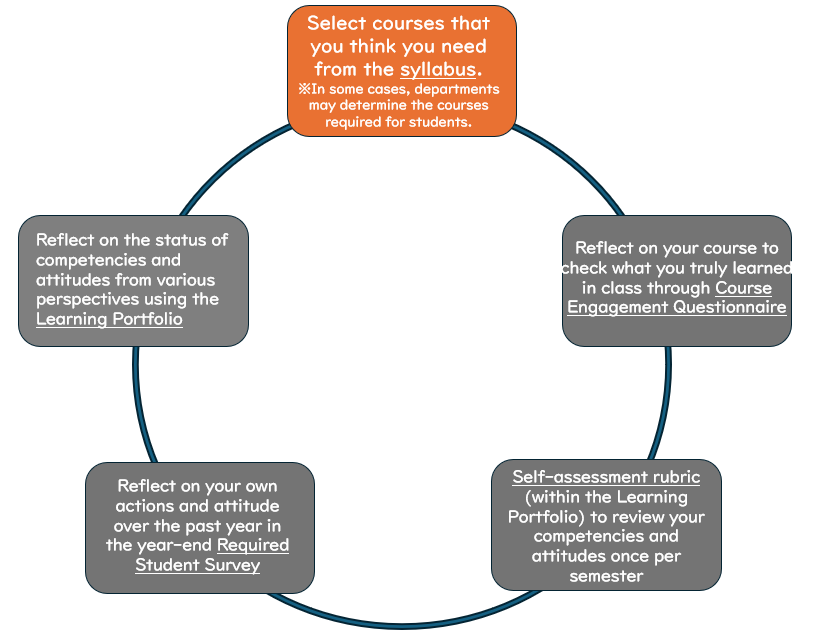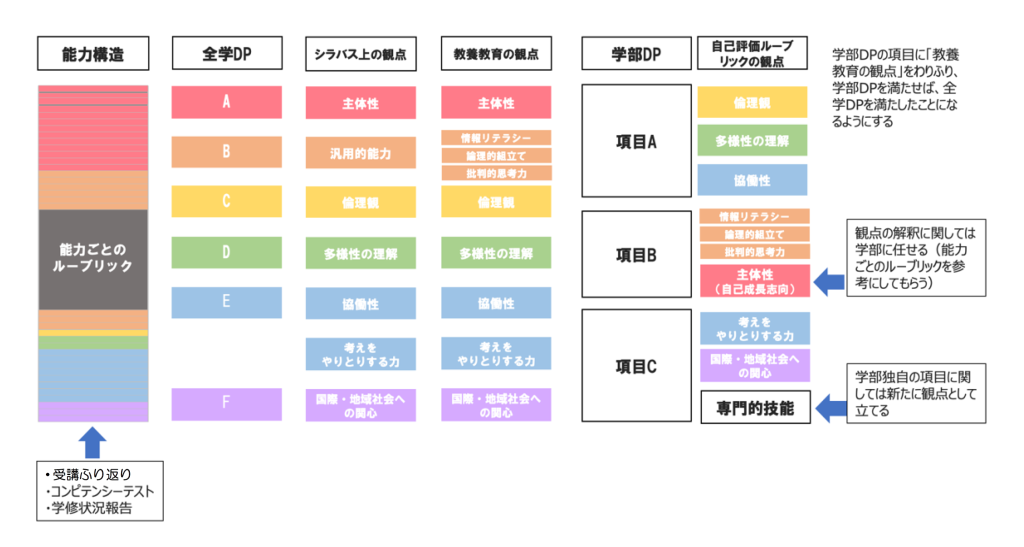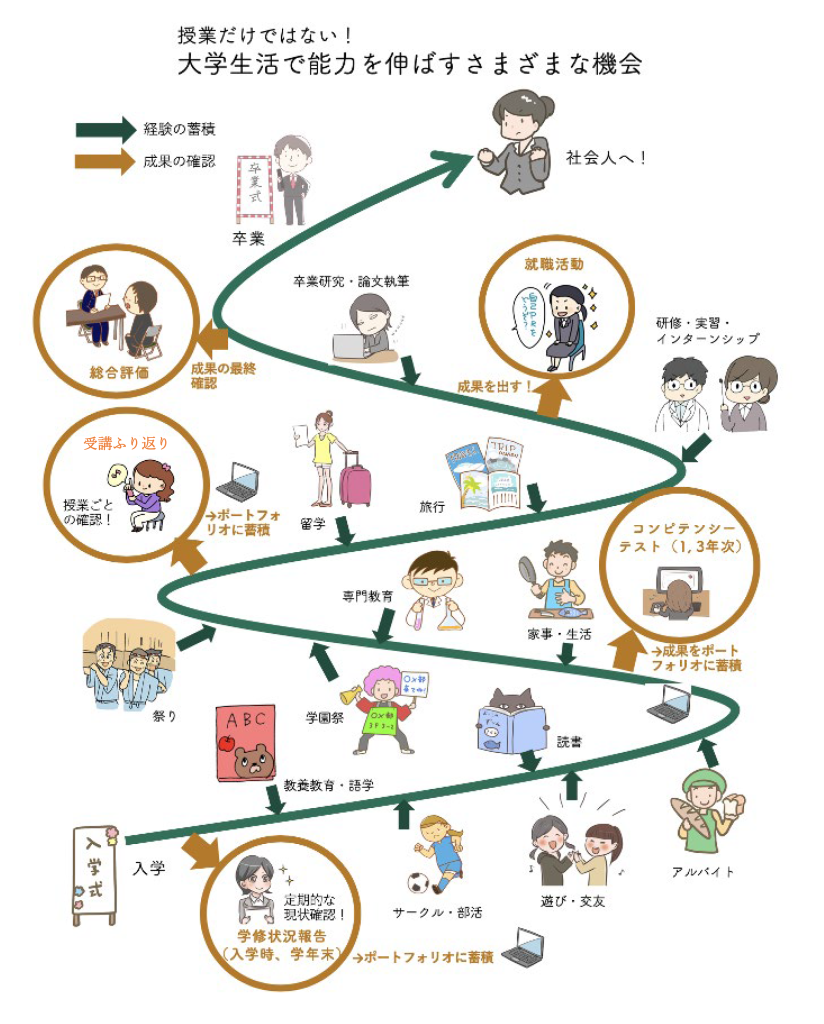At Nagasaki University, you will earn the credits required for a four- to six-year educational program, and in addition,
- You can learn, think, insist, and act on your own.
- Acquire general-purpose skills that can be utilized across fields and areas.
- Acquire basic knowledge and skills as a professional and researcher, and acquire a high sense of ethics.
- Understand the diversity of the global environment and society.
- You can collaborate with others with independence.
- Acquire a global perspective that contributes to the local community and future generations. (Nagasaki University Diploma Policy)
A degree (Bachelor’s degree) is to be awarded to those who are recognized as having a degree.
This is the policy for graduation certification and degree conferral (diploma policy) required by the entire university, but each faculty, department, course, etc. also has a policy for each specialized field. Students must acquire knowledge and skills, as well as all of these abilities and attitudes set forth in the policies of the entire university and departments.
How should I acquire these abilities and attitudes while I am in school?
Nagasaki University is promoting active learning. Active learning is self-reliant learning. From liberal arts education to specialized education, Nagasaki University actively adopts methods to encourage active learning and small-group education to foster student independence and collaboration. In addition, in order to establish independent learning, we also have an independent learning promotion support system called LACS (Learning Assessment & Communication System). This LACS has a learning portfolio, submission of reports for each lesson, receipt of handouts, and communication between faculty and students.
Furthermore, in order to encourage independent learning, we have established a syllabus, Course Review, Required Student Survey, and a study portfolio so that students can check their abilities and attitudes from various angles.
The learning portfolio as a record of learning while in school is also used for “comprehensive evaluation” at the time of graduation. This is specified in the curriculum policy of Nagasaki University.
Curriculum Policy (Excerpt)
Students accumulate their learning achievements in the learning portfolio system at any time. You can check your own growth trajectory by looking back on your learning portfolio. In addition, the learning portfolio will be used as a material for student guidance and advice by mentor faculty members. Furthermore, at the time of graduation, it will be used as a material for comprehensive evaluation of academic achievement at the university.
First of all, to find out what kind of abilities and attitudes you can acquire in each class, please check “Ability that you want to acquire through this class other than knowledge and skills” of the syllabus. It is clearly stated which of the seven items of independence, general-purpose ability, ethics, understanding of diversity, cooperation, ability to exchange ideas, and interest in international and local communities should be acquired. I am.
You can check whether you have acquired that ability and attitude in the class by the Course Review, “Do you think your own behavior and attitude have changed through this class?”
The items checked in the Course Review are accumulated in the learning portfolio, and it is possible to check how many classes have been able to acquire those abilities and attitudes so far. This will help you choose which class to take, and you will be able to see your own tendency to take it by comparing it with others.
In addition, by checking the self-assessment of abilities in the learning portfolio once every six months, you can grasp the status of each ability. In addition to the abilities listed in the above-mentioned university-wide diploma policy, the ability to check can evaluate the abilities required for each department.
In addition, the following items regarding the frequency of actions in the study status report conducted at the time of admission and at the end of the year are also accumulated in the study portfolio so that you can compare them with other people. You can review your behavior.
In this way, Nagasaki University has established the ability standards that should be cultivated while attending school in the university-wide diploma policy and the diploma policy of each department, and the syllabus, Course Review, Required Student Survey, and self-evaluation of ability rubrics are designed consistently. ..
Are the abilities and attitudes cultivated at the university really utilized even after graduation? Nagasaki University conducts graduation surveys and corporate surveys once every four years by asking graduates and various companies to cooperate. This is useful for examining whether the education at Nagasaki University is really meaningful and whether there is anything that needs to be improved.
The above-mentioned reflections on the Course Review, Required Student Survey, and self-assessment of abilities Rubric’s answers compare the syllabus of each class, and if the curriculum of each class or department is insufficient, it should be improved. Will be considered and used to improve university education.
Various abilities and attitudes can be acquired not only in class but also in extracurricular activities such as club activities and volunteer activities. Please have various experiences while you are in school.





